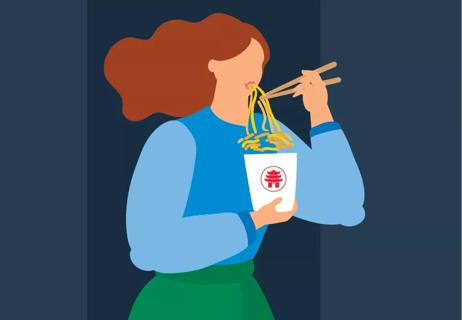Get moving, avoid the scale and be kind to yourself — plus, learn your triggers

How did that family-sized bag of potato chips empty so fast? You ripped it open last night while sitting on the couch watching a movie and now there’s just a smattering of greasy crumbs left inside.
Advertisement
Cleveland Clinic is a non-profit academic medical center. Advertising on our site helps support our mission. We do not endorse non-Cleveland Clinic products or services. Policy
A large pepperoni pizza seemed to magically disappear during the evening, too. Ditto for the rest of the ice cream in the freezer.
As you survey the kitchen carnage, you suddenly feel terrible — and not just because of a lingering belly ache. The fallout from a food binge can bring out emotions such as guilt, regret and worry.
So, what should you do now to turn things around physically and mentally? Registered dietitian Beth Czerwony, RD, has some suggestions.
Let’s get your system reset. Here are five tips to help the process.
Video content: This video is available to watch online.
View video online (https://www.youtube.com/embed/GDw4VmHswLw)
YouTube video player
Don’t judge yourself harshly after a deep dive into the refrigerator or pantry. It happens, says Czerwony. “It’s not uncommon to have a periodic food binge,” she adds. “So, give yourself some grace.”
Want to move that food out of your system? Then get yourself moving. “It’s like a natural detox,” says Czerwony. “Physical activity increases gut motility to push all of that extra junk — the calories, the fat, and the sugars — out of your system.”
Movement also triggers your brain to release dopamine and serotonin, feel-good chemicals that can boost your mood and help you get back on track mentally.
So, go for a walk or hop onto an exercise bike for a quick spin to get your body in motion and your mind focused. Tackling some chores — such as cutting the lawn or vacuuming — can get the job done, too.
Advertisement
Want to help your body reboot? Just add water, which can help flush out any excesses from your system.
“Plus, proper hydration is key for your body to operate at an optimal level in so many ways,” explains Czerwony. “It helps your digestive system. It’s good for your blood. It benefits your kidneys, your skin … even your teeth.”
Bottom line: If you’re hydrated, you just feel better.
Let’s state the obvious: If you go on a food binge, it’s possible that a higher-than-usual number may pop up on the scale if you step on it. Czerwony’s advice? Don’t go looking for information that isn’t helpful.
“When you go back to your normal eating routine, you’ll go back to your usual weight,” she says. “Give your body a few days to reset back.”
And remember, too: Weight isn’t the only or best measure of health. “Feeling strong, sleeping well, having an extra bounce in your step … those are going to be better indicators for you,” Czerwony adds.
Taking forcible action to undo a food binge — whether by vomiting, using laxatives or exercising excessively to suddenly subtract consumed calories — isn’t a healthy solution, emphasizes Czerwony.
“These are eating disorder behaviors and they can cause serious damage to your body,” she warns.
Complications could include:
If you’re binging and purging, talk to a healthcare provider to get assessed.
So, now you’ve reset after a food binge. Next, let’s work on figuring out why you went on that eating frenzy and how to prevent repeated episodes.
A food binge often is tied to either an emotional or environmental trigger. “There’s usually a reason behind it,” notes Czerwony. “Understanding what that is may help you prevent a future binge.”
Stress, trauma or even boredom can send you to the pantry in search of comfort. “A lot of times, we turn to food because it’s soothing,” says Czerwony. “It’s an easy and accessible way to find instant satisfaction.”
The best defense to that? Learn how to separate yourself from food if you get that urge to binge.
“Do something action-oriented, like calling a friend or going for a walk,” she advises. “Take your focus away from the food until the feeling passes.”
Advertisement
Just seeing certain foods can make you start nibbling. It might be a bowl of candy sitting on your desk, a plate of cookies at a party or a steaming hot pizza that your hungry teen just had delivered.
To put yourself in a better position to avoid mindless eating in situations, try:
“And if you know that certain foods are always triggers, don’t buy them at the store and bring them to the house,” says Czerwony. “It’s much easier to make healthy choices if you have healthy food available.”
Data doesn’t lie, right? Keeping a journal noting what and when you eat can help you identify what food breaks down your defense mechanisms and what days or times you’re prone to overindulge.
“Track your intake and learn what’s really going on,” says Czerwony. “You can’t address a problem until you identify it.”
Let’s start with this idea: Food is a neutral item. “We’re off base a bit when we talk about ‘good food’ and ‘bad food,’” states Czerwony. “We shouldn’t be passing judgment when we eat something.”
Advertisement
Look at your daily diet in totality. Don’t beat yourself up for treating yourself to a donut. Instead, enjoy it and make adjustments elsewhere.
“When food tastes good we eat it,” says Czerwony. “That doesn’t make you bad. It makes you human. So, move on and find a balance in your diet that isn’t swinging to the extremes of binging.”
To hear more on this topic, listen to the Health Essentials Podcast episode, “How to Reset After Overeating.” New episodes of the Health Essentials Podcast publish every Wednesday.
Advertisement
Learn more about our editorial process.
Advertisement

Don’t let emotions trigger bad food habits

They cause junk food cravings at night

A comprehensive guide to symptoms, tips for intervention & treatment

The flu, RSV, COVID-19, pneumonia and more typically circulate during cold weather months. I added this change

Simple swaps improve a comfort food staple.

Simple swaps improve a comfort food staple.

Type 2 diabetes isn’t inevitable with these dietary changes

Applying a hot or cold compress can help with pain